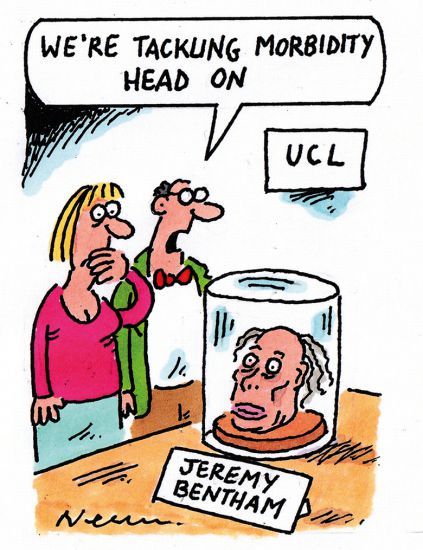
Poor Jeremy Bentham. The 19th-century philosopher and founding father of University College London insisted that his body be preserved after his death so that mourning friends could wheel him out at parties. But when it came to it, his poorly mummified head was deemed too ugly to put on show with the rest of his body. Disgusted curators plonked the severed head in a safe, from which it has traditionally been removed just once a year to check that his skin and hair are not falling off. A different sort of indignity has befallen Bentham’s preserved skeleton (dressed in clothes and topped by a wax head), which is sometimes required to be present at UCL council meetings. Now, the prized real noggin is being troubled once again for DNA samples so that scientists can test theories that Bentham might have had Asperger’s or autism. And at last, the head will finally be put on public display at a UCL exhibition, What Does It Mean to Be Human? Curating Heads at UCL, the university confirmed on 3 October.
“The Conservatives are set to sever links with every Tory university group in the country in a bid to detoxify their brand,” the Huffington Post reported on 4 October. Cutting off your youthful supporters seems a counter-intuitive step towards recovery with young voters, but the website had some valuable context for the confidential internal Tory report that “calls for ‘risky student politics’ to be moved completely out of the party structures”. The recommendation follows “a series of embarrassing incidents involving student groups, including a member of the Cambridge University Conservative Association burning a £20 note in front of a homeless person and Tories at St Andrews setting fire to an effigy of Barack Obama”. When you put it like that, student politics does sound a little incendiary for the Conservatives.
College campuses teach Americans to “hate their country and religion”, according to Donald Trump’s eldest son. Defending his father in an impassioned speech at a university fundraiser, Donald Trump Jr also appeared to mock universities’ focus on diversity, along with “safe spaces” for women, ethnic minorities and LGBTI students. His father was criticised only because of an “atmosphere of hatred” spawned by liberal university campuses and traditional media, he said. “Today’s conservative speech is violence,” Mr Trump Jr grumbled. “Unprovoked liberal violence is self-defense. Words have lost their meanings.” Mr Trump Jr’s address was delivered to a private Christian college, Faulkner University in Alabama. While a college spokeswoman confirmed that the institution had paid for the honour, she declined to disclose how much. According to student newspaper The North Texas Daily, however, Mr Trump Jr is to be paid $100,000 (about £76,200) to speak at an upcoming University of North Texas event later this month.
Impoverished students will be relieved to hear that there’s a solution to money shortages experienced while at university – just spend less! At a fringe meeting at the Conservative Party conference in Manchester, universities minister Jo Johnson was asked about the pressure placed on parents to supplement maintenance loans. He replied: “There are many other ways in which students could fill that gap. They can work…they can also save…then of course they can borrow from their parents if they wish, but it isn’t necessarily a parental contribution.” He added: “Some students want to live very modestly and have a frugal existence, focusing on their studies. Other students may want a different lifestyle, but there isn’t one cost of going to university – it’s a very specific choice that each individual will make.” The comments were widely reported by the media on 3 October, but much of the gaffe limelight was drawn away from Mr Johnson by his brother, Boris, who helpfully chose that day to make some crass comments about clearing away dead bodies in Libya.
England’s teaching excellence framework has a new name: the teaching excellence and student outcomes framework. The Department for Education first used the new title in a specification document for the third year of the exercise, published on 9 October. The change reflects the introduction of new supplementary metrics, including the proportion of a university’s graduates in employment or further study and the proportion above the “median earnings threshold”, as measured by data from the government’s new Longitudinal Education Outcomes project. Although the full name changes, the acronym will remain as TEF, the DfE clarified. Which is a shame in a way, as TESOF had good potential to serve as an insulting imperative.
Register to continue
Why register?
- Registration is free and only takes a moment
- Once registered, you can read 3 articles a month
- Sign up for our newsletter
Subscribe
Or subscribe for unlimited access to:
- Unlimited access to news, views, insights & reviews
- Digital editions
- Digital access to THE’s university and college rankings analysis
Already registered or a current subscriber? Login



